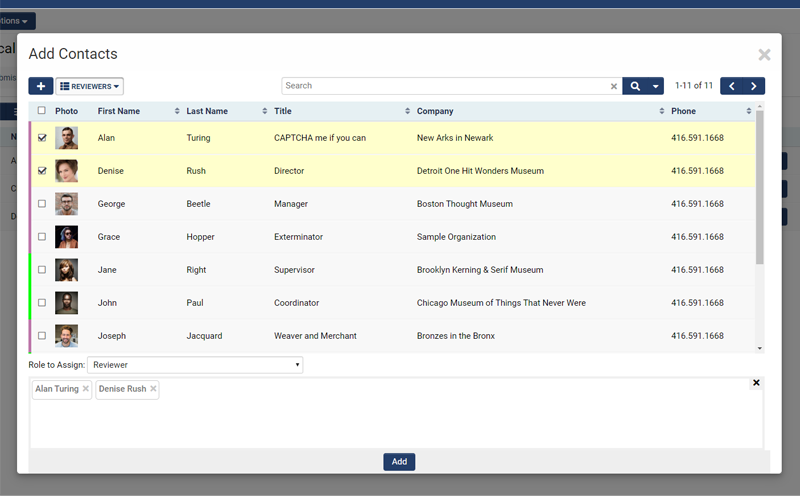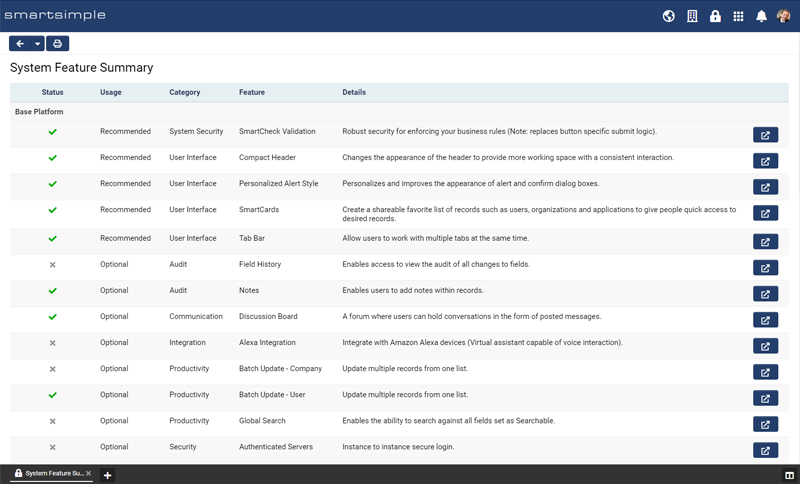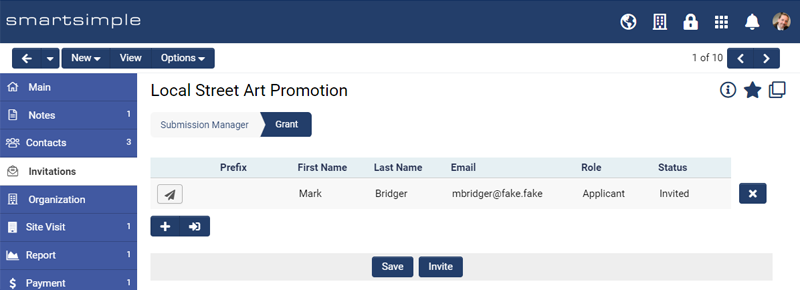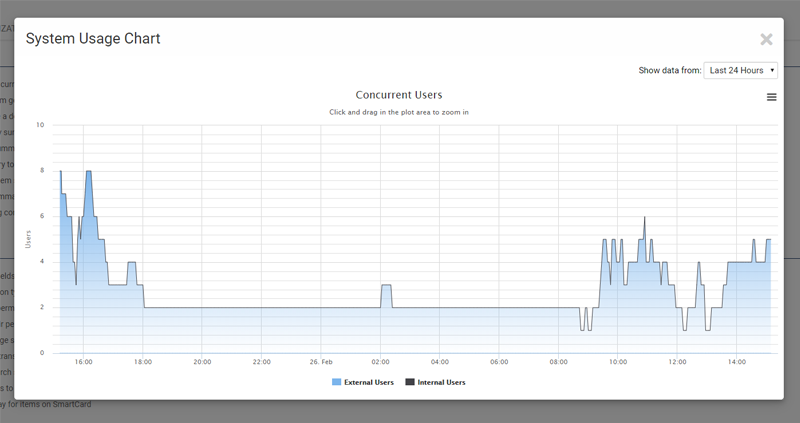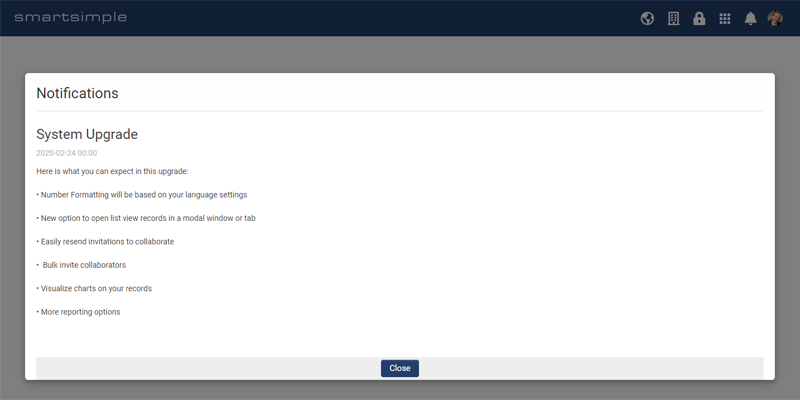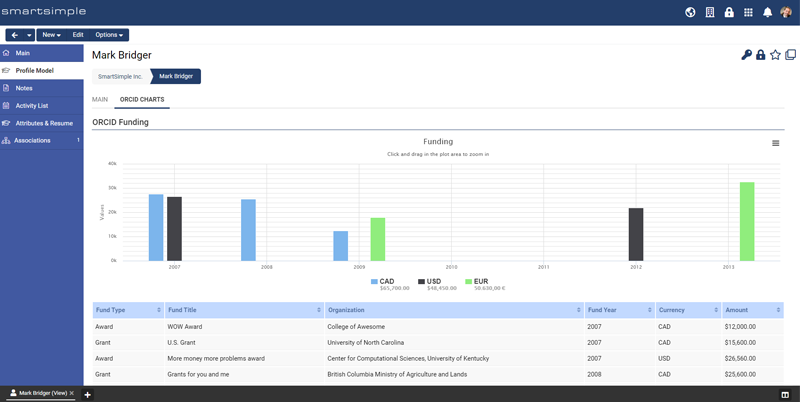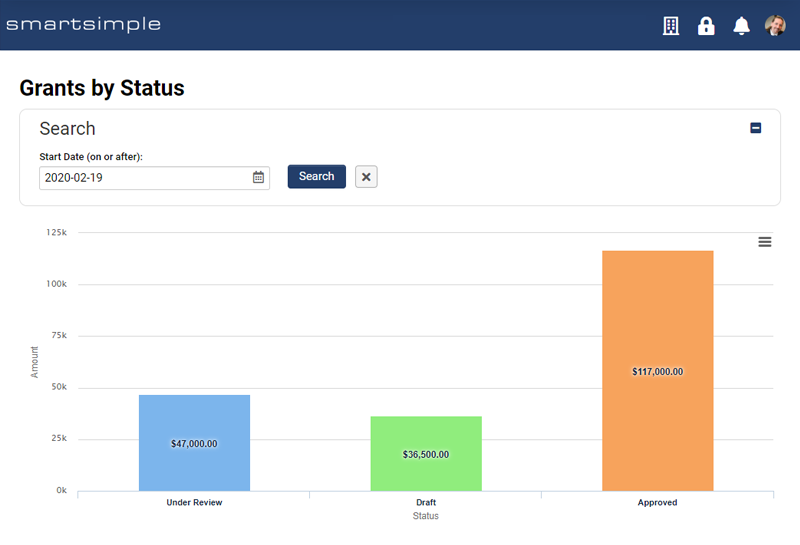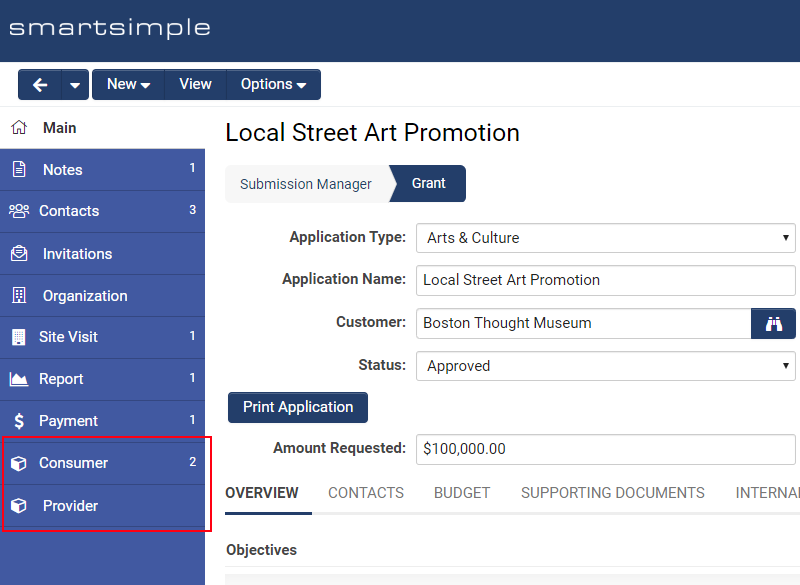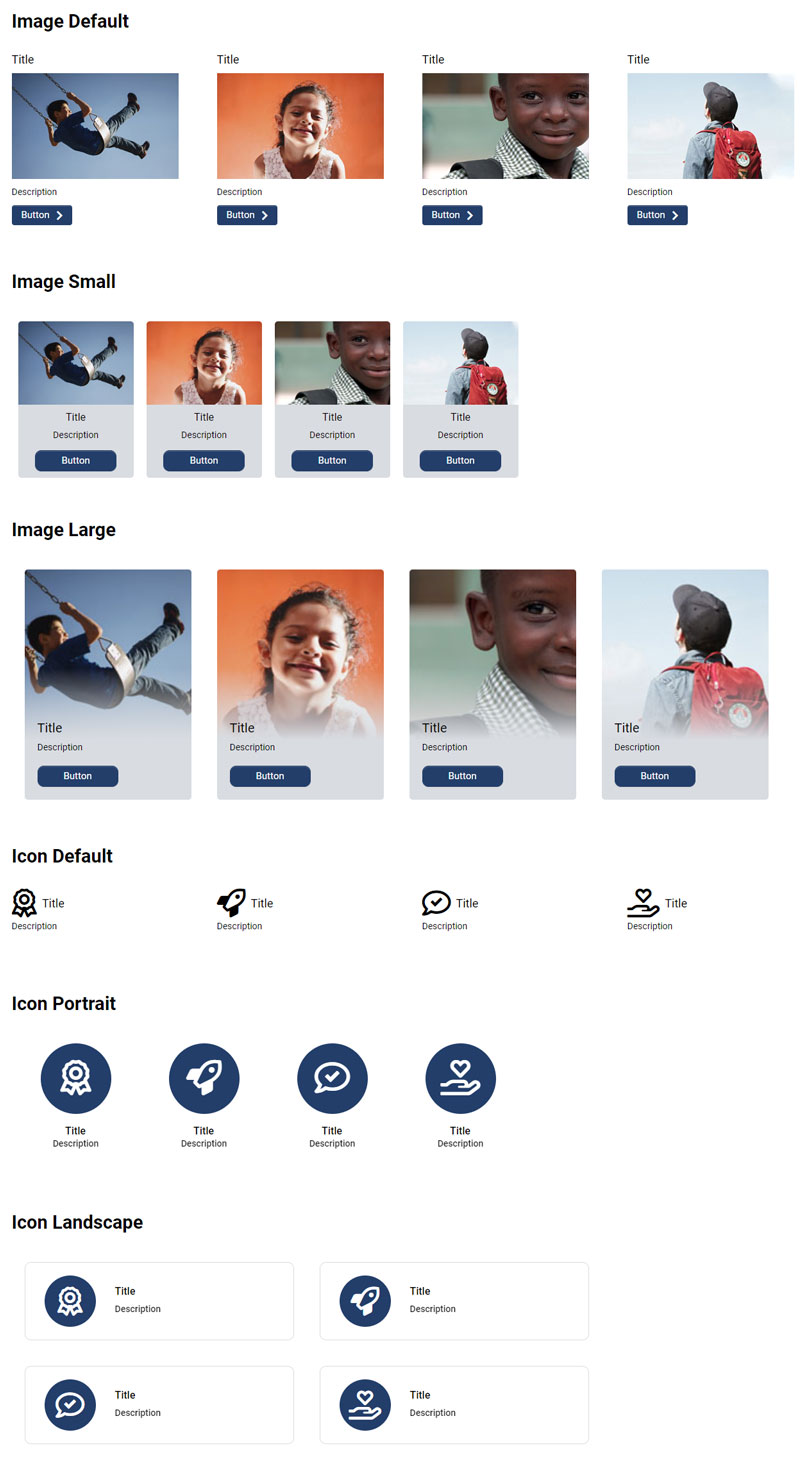Upgrades
Contents
[hide]- 1 General Information
- 2 Previous Upgrades
- 3 Current Upgrade Package
- 3.1 General Details
- 3.2 Overview
- 3.3 Global System Upgrades
- 3.3.1 Major Updates
- 3.3.1.1 Deprecated Personal Number Format Setting
- 3.3.1.2 Deprecated Permission to Manually Reset User Passwords
- 3.3.1.3 Updated Association List Entry Interface
- 3.3.1.4 Added More Date Search Options for List Views
- 3.3.1.5 New Portal Section Search Screen for Admins
- 3.3.1.6 New Centralized Email Template Search Screen for Admins
- 3.3.1.7 New Feature Summary Page
- 3.3.1.8 Multiple Enhancements and Updates to Invitation Feature
- 3.3.2 Minor Updates
- 3.3.2.1 Deprecated Ability to Create Classic Reports
- 3.3.2.2 Updated Configuration Page for Reports
- 3.3.2.3 New System Usage Chart
- 3.3.2.4 Enhanced Record Navigation to Retain Previous Position
- 3.3.2.5 New List View Configuration Option to Define Open Behaviour
- 3.3.2.6 Added Ability to Include Personal List Views for Dashboards
- 3.3.2.7 Added Bulk Assign Function to Assignment Grid
- 3.3.2.8 Added Batch Update Button for Association List Views within Record
- 3.3.2.9 Added Option to Send Notification Broadcasts with High Visibility
- 3.3.2.10 Added Visibility of Emulation Login Activity in Login History
- 3.3.2.11 New Summary Chart for ORCID Profile Information
- 3.3.1 Major Updates
- 3.4 On-Demand System Upgrades
- 3.4.1 Major Updates
- 3.4.1.1 New Ability to Restrict Allowable File Types for Upload
- 3.4.1.2 New Custom Field Type for Displaying Charts
- 3.4.1.3 Extended Ability to Create Tabbed List Views for Provider/Consumer List Views
- 3.4.1.4 Extended Ability to Present Custom Filtering Options for Portal Charts
- 3.4.1.5 Added Additional Styling Options for Portal Shortcuts
- 3.4.1.6 Enhanced Custom Filtering Options for List Views
- 3.4.1.7 Multiple Enhancements and Updates to Report Export Functionality
- 3.4.1.8 Added Edit Permission per Report
- 3.4.2 Minor Updates
- 3.4.1 Major Updates
- 3.5 Beta Previews
- 3.6 Notes for Admins
- 3.6.1 Updated Behaviour of Field Updates Under SmartVersioning
- 3.6.2 New Portal Section Templates for Website Theme
- 3.6.3 Updated Integration Keys for Use with Report and Autoloader Configurations
- 3.6.4 Added Greater Control of View and Edit Conditions for Individual Sections within Advanced Data Table Custom Field
- 3.6.5 Added Ability to Review Activation Email Upon Creation of New Instance
- 3.6.6 Added Additional Caption Setting for Privacy and Security Policies
- 4 Future Upgrades
General Information
Next Upgrade Date
The next upgrade is scheduled for July 20 2023.
Upgrade Schedule
| Upgrade | Key Release Date | Global Release Date |
| February 2025 | Thu, Feb 13 2025 | Thu, Feb 27 2025 |
| June 2025 | Thu, Jun 12 2025 | Thu, Jun 26 2025 |
| October 2025 | Thu, Oct 9 2025 | Thu, Oct 23 2025 |
| February 2026 | Thu, Feb 12 2026 | Thu, Feb 26 2026 |
| June 2026 | Thu, Jun 11 2026 | Thu, Jun 25 2026 |
| October 2026 | Thu, Oct 8 2026 | Thu, Oct 22 2026 |
We regularly update the list of upgrade features and schedule for both the backup and production environments on this Wiki page.
This page will provide a general overview of each upgrade, with links to the Wiki articles describing the new or updated features and how to use them.
System Upgrade Process
The objective of the System Upgrade Process is to ensure that customers have a chance to review, without compromising the integrity of their production system, how their applications and information will work following the upgrade. In order to take advantage of this you will need to know how to access your backup instance of SmartSimple. If you need assistance with this either refer to the Backup Server and Testing Instances Wiki article, or contact the SmartSimple support desk.
For clients on a Private Cloud environment, please review the SmartSimple Upgrade Process – Dedicated Server page.
Upgrade Schedule Details
The following tables outline the detailed upgrade release cycle.
If you are part of our Key Release your SmartSimple Cloud system will be automatically upgraded according to the following schedule. Generally North American Clients are on the Key release.
| Hosting | Environment | Date | Maintenance Window | Typical Downtime |
| Key Release | Production | Second Thursday of an upgrade month | 22:00 - 23:59 EST | 5 minutes |
| Key Release | Backup | Two weeks prior to the production upgrade | 22:00 - 23:59 EST | 5 minutes |
If you are part of our Global Release your SmartSimple Cloud system will be automatically upgraded according to the following schedule. Generally clients in Europe, Middle East and Asia as well as Managed Dedicated clients are on the Global release.
| Hosting | Environment | Date | Maintenance Window | Typical Downtime |
| Global Release | Production | Fourth Thursday of an upgrade month | 22:00 - 23:59 local time | 5 minutes |
| Global Release | Development/Test | Fourth Thursday of an upgrade month | 22:00 - 23:59 local time | 5 minutes |
| Global Release | Backup | Second Thursday of an upgrade month | 22:00 - 23:59 local time | 5 minutes |
If you are on dedicated environment that is client-managed your SmartSimple Cloud system is only upgraded manually by your system administrator or by submitting a request to SmartSimple. The upgrade package is made available for you according to the following schedule.
| Hosting | Environment | Date | Maintenance Window | Typical Downtime |
| Global Release | All | Fourth Thursday of an upgrade month | client-managed | 5 minutes |
Backup Environment Update
- Each backup environment will be updated to the "release candidate" prior to the upgrade date.
- This update will provide for instance specific testing of release candidate, as you can log into your respective backup environment and test the changes against your most current data and configuration.
- Internal staff will also be using these environments to perform instance specific testing.
Update Go/No-Go
- Subject to satisfactory testing on both the pre-production environments and the backup environments, the Go/No-Go decision will be made on the Wednesday prior to an upgrade release.
Upgrade Feedback and Questions
If you have questions or need assistance or want to share your thoughts on the upgrade contact our support team toll-free at 866.239.0991 or email support@smartsimple.com
Previous Upgrades
See the Previous Upgrades page for a list of previously-implemented upgrade features.
Current Upgrade Package
General Details
Upgrade Dates
Public Cloud Production release date: March 12th 2020
Public Cloud Backup release date: February 25th 2020
Private Cloud Production (Managed Upgrades) release date: March 26th 2020
Private Cloud Backup (Managed Upgrades) release date: March 12th 2020
Overview
Watch this video to get a general overview of the new features in this release.
To watch this video in full screen, please click on the full screen button on the bottom right.
Global System Upgrades
The new features listed below are enhancements to the SmartSimple system and will be immediately available to SmartSimple users upon the application of the upgrade to their server:
Major Updates
Deprecated Personal Number Format Setting
Deprecated the personal setting for number format display. Instead, the system will now use the user's locale, e.g. regional language, in order to determine the format in which to display the thousands and decimal separators of a number field.
For example a text box number field will display as follows:
| English | 100,000.00 |
| French | 100 000,00 |
| Spanish | 100.000,00 |
Currency fields will display as follows:
| US Dollar | $100,000.00 |
| Euro | English €100,000.00 / French 100 000,00 € / Spanish 100.000,00 € |
| Japanese Yen | ¥ 100,000 |
| UK Pound | £100,000.00 |
| Canadian Dollar | English $100,000.00 / French 100 000,00 $ |
Deprecated Permission to Manually Reset User Passwords
Changed the user role permission that allowed the manual reseting of a user's password, instead to just allowing the resending of password to the user. This was done to improve the security of your system by taking an extra step to prevent the abuse of admin rights in reseting user passwords. The Able to Set Password setting found under a user role permissions menu has now been updated to only allow the ability to send a new password to a user. Note, that Global Administrator type users will still however retain the ability to manually set a user's password.
Updated Association List Entry Interface
Updated the new association list entry behaviour to improve user experience and simplify the process of associating contacts and organizations to a record. If you haven't already, you can give this new interface a try in Global Settings -> Classic Options -> and untoggle the option labelled "Use Classic Association Entry View". The new association entry makes it more efficient when searching and adding multiple users at a time.
Added More Date Search Options for List Views
Added additional options for list view search criteria to simplify filtering on dates. Introduced more relative date options for filtering list views, e.g. on or before today, and on or after today.
New Portal Section Search Screen for Admins
New settings page for administrators that lists all portal configurations in a single list view. This lets you search and edit portal configurations more quickly and easily. This list view can be found in Global Settings -> Users -> Portals.
New Centralized Email Template Search Screen for Admins
New settings page for administrators that lists various configured email templates in one location. This lets you quickly review and edit email templates from workflow tasks and other areas. This list view can be found in Global Settings -> Communications -> Email Templates.
New Feature Summary Page
New summary page of platform features to help you keep up to date on the latest and greatest features being released. This feature summary page will list our recommended features and provide easy access links for you to set them up. You can find this page in Global Settings -> System Feature Summary.
Multiple Enhancements and Updates to Invitation Feature
Several functional enhancements for the Invitation feature. Enhanced the Invitation feature with the ability to define multiple invitation templates per role. Previously, you were limited to configuring only a single invitation template per role. A UTA Setting, under Classic Options, has been introduced in order to allow you to enable multiple invitation templates per role, so as not to affect current functionality and behaviour. Also, added new alert option for Invitation feature to allow configuration of an alert to be sent upon a user declining an invite. This can be used in situations where user acceptance of invitations is time sensitive and you wish to be alerted on declined invites. Also, added the ability to re-send pending invites on the invitation screen. A new re-send invite button has been introduced on the invitation screen to do this. Also, introduced the ability to import invitations in bulk through an import wizard, that is currently only available to UTA administrators via the UTA Settings menu. Lastly, the invitations in your system have been made available to the report builder allowing you to create custom reports on invitations and their status.
Minor Updates
Deprecated Ability to Create Classic Reports
Deprecated the ability to create classic style reports. Existing reports will continue to function, but you will not have the ability to copy or create any new reports that use the classic report builder.
Updated Configuration Page for Reports
Updated the configuration page for reports to the arcadia interface for improved look and feel, as well as user experience. The configuration page of a report has been updated with a left navigation bar, and some reorganizaton of the settings.
New System Usage Chart
New system usage chart available for admins to review the usage of your system. This chart can be found in Global Settings -> called System Usage Chart and will show you the number of concurrent user sessions in your system at different points in time.
Enhanced the record navigation functionality to retain your previous position after navigating away. The side-scrolling record navigation will attempt to remember your previous position now even after navigating away from the record. This record navigation feature appears when you open a record from a list view, and the arrows at the top right indicate which record position you are viewing relative to the list view results.
New List View Configuration Option to Define Open Behaviour
New option introduced within list view configurations that allows you to define the open behaviour of a record. You can now let the end user choose if they want to open a record in a new tab, modal layover or full screen. You can also force records to always open in full screen or a modal layover.
Added Ability to Include Personal List Views for Dashboards
Added the ability to include a personal list view within a personal dashboard. Note that a dashboard with a personal list view will not be able to be shared with other users.
Added Bulk Assign Function to Assignment Grid
Enhanced the assignment grid functionality with a new button to bulk assign all users in a role of your choice to save time.
Added Batch Update Button for Association List Views within Record
Updated list views within a record to manifest the batch update button for those with the permission to use the batch update functionality. The association lists within a record, e.g. the list of UTA Level 2 activities when viewing a UTA Level 1 record, will now show admins a batch update button so they may perform a batch update when reviewing the parent record.
Added Option to Send Notification Broadcasts with High Visibility
Updated Notification Broadcasts with a new option for higher visibility. This option will automatically open the notification on user's screens in a larger format to garner more attention.
Added Visibility of Emulation Login Activity in Login History
Added visibility of login activity through emulation into the login history of a user. An additional column has been added to show when user emulation was used to login as a user.
New Summary Chart for ORCID Profile Information
New built in charts displaying a user's ORCID information has been made available. If your instance has enabled ORCID integration, you will see a new Chart tab within the Profile Model sectio of a user profile, given that they have imported their profile from ORCID.
On-Demand System Upgrades
The following features are available immediately with the application of the upgrade, but must first be enabled or configured by a System Administrator:
Major Updates
New Ability to Restrict Allowable File Types for Upload
Added the ability to restrict the file types allowed for upload at a global level. Within Global Settings, you may now define a list of file extensions that are allowed for upload in order to restrict malicious file types and improve the security of your system.
New Custom Field Type for Displaying Charts
New custom field type introduced "Special - Chart" that will allow you to display a visual chart on a record, that represents information of other related records. For example, you can now create a chart custom field on a UTA Level 1 record that displays aggregate information regarding its Level 2 activities. Within the configuration of the field, you define which record sets and which fields to plot in the chart, and you can choose from various chart types with functionality ranging from aggregates to timeline schedules.
Extended Ability to Create Tabbed List Views for Provider/Consumer List Views
Extended the ability to create specific tabbed listviews to be available for provider / consumer list views. You can now separate out provider / consumer list views to show specific record types.
Extended Ability to Present Custom Filtering Options for Portal Charts
Extended the ability to present custom filtering options to end users for charts in portal sections. Previously, we introduced the ability to present specific fields for filtering list views in a portal section, and this has now been made available for chart type sections as well.
Added Additional Styling Options for Portal Shortcuts
Added aditional styling options for portal shortcuts. With a portal menu set to website theme you will see these new display options for image and icon shortcuts.
Enhanced Custom Filtering Options for List Views
Enhanced list view sections within a portal. Introduced the ability to re-order the fields made available for search filtering. Also, introduced the ability to create a shortcut within a portal that links directly to a list view section for simplified user experience in a portal. Lastly, introduced the ability to hide the column of any list view to allow you the ability to search or sort on a field, while not being mandatory to having to list the field in a list view.
Multiple Enhancements and Updates to Report Export Functionality
Enhanced the options available for scheduled exports of reports. Introduced the ability to retain a copy of an exported report in a SmartFolder while also exporting to an external file repository. Also, introduced the ability to send email notification and results upon completion of export. Also, enhanced the scheduling ability of the report export, to allow for greater control of scheduling beyond daily exports. Lastly, introduced audit logs for scheduled export in order to capture their function history.
Added Edit Permission per Report
Added the ability to allow edit of specific reports to specified user roles without granting the report manager permission to edit all reports.
Minor Updates
New Custom Field Type for Lookup of NACE Codes
New custom field type to lookup standard classification codes known as the Statistical Classification of Economic Activities in the European Community (NACE).
Added Option for Grid Style List Views to Display Image from Parent Record
Updated grid style list views with the ability to display images from the parent record. For example, a UTA Level 2 list view can now be configured to display an image from the parent UTA Level 1 record.
New Option to Restrict Access to Backup Environment
New option to restrict access to the backup environment. New permission added to the Feature Permissions page named "Restrict Login to Backup Environment to these Roles". Note that enabling this restriction will not apply to global administrator type user accounts, or to the use of user emulation of another user in the backup environment.
Beta Previews
No features are available for beta preview this upgrade.
Notes for Admins
Updated Behaviour of Field Updates Under SmartVersioning
Updated the behaviour of field update actions when using SmartVersions. Deprecated the ability to create new field directly under a non-core field set. Instead, you can do this by creating a new field under the core field set, and then pushing this field out to any other version field set that you wish. The delete functionality has also been updated, so that deleting a field from the core field set will also delete the field from every other version. These changes were made in order to improve the consistency of SmartVersion functionality.
New Portal Section Templates for Website Theme
New templates have been made available for you to easily configure a website themed portal. These templates are applied per individual main menu link, and using them will wipe out any current configuration you have for that main menu link and replace it with the template. For example, within a portal main menu link, if you have selected the website theme, you will now have an additional option to deploy one of our pre-made templates that will instantly setup the section according to different available layouts that you can select from.
Updated Integration Keys for Use with Report and Autoloader Configurations
Updated the configuration of Report Exports and Autoloader Imports to external SFTP sites with the ability to use custom Integration Keys. Instead of configuring authentication and endpoint information per Report or Autoloader, you can now setup a custom Integration Key with this information, and then have multiple Reports or Autoloaders point to an Integration Key.
Added Greater Control of View and Edit Conditions for Individual Sections within Advanced Data Table Custom Field
Enhanced options for sections within an Advanced Data Table type custom field, granting you greater granular control over when a section is displayed as well as when it may be modified. Extended the standard permission and availability options for custom fields to individual sections to allow you to configure at what statuses or record types a section is made available. This can be used to lock specific sections within a Data Table field from modification at different record stages. Section titles and section instructions can also be defined inside the section now.
Added Ability to Review Activation Email Upon Creation of New Instance
Updated the template of the email that is sent upon new instance activation. Also added the ability to review past activation emails that have been sent out incase you did not receive an email.
Added Additional Caption Setting for Privacy and Security Policies
Added additional caption setting for privacy and security policies. This will allow you to configure more human readable labels for the policy version that a user has agreed to. You can also report on both the Policy name and caption.
Future Upgrades
View future upgrade dates.
